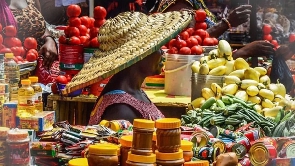 Ghana's inflation rose to 37.2% in September 2022
Ghana's inflation rose to 37.2% in September 2022
The 2022 World Bank’s Africa Pulse Report has ranked Ghana as the country with sub-Sahara Africa’s (SSA) highest food prices.
The report was released at the end of last month, October 2022, and indicated that domestic food prices have gone up by 122 percent since January this year.
Indeed, the country’s inflation has been rising to an all-time high of 37.8 percent for September 2022 – driven largely by food prices, according to data from the Ghana Statistical Service.
With many Ghanaians feeling the heat and cost of food prices running out of control, the situation is being exacerbated as the year-on-year inflation rate for September 2022 from the 16 administrative regions was almost 38 percent.
This means general price levels have soared in September 2022, higher than September 2021 as month-on-month inflation between August 2022 and September 2022 was 2 percent, according to the Ghana Statistical Service.
Correspondingly, panelists in the agribusiness sector during the 11th Ghana Economic Forum (GEF) cautioned Ghanaians to brace for more hikes in cost of food over the coming months.
The panel included Chairperson of the Agribusiness Association of Ghana Industries, Fatima Alimohamed, who disclosed that “there is a looming shortage of foodstuff and its associated high costs”.
The discussions were on the topic ‘Ensuring food sustainability and security: an analytical overview of the PFJ and implications for economic growth’.
Also, the Food and Agriculture Organisation (FAO) has projected in its Finance and Development Journal that food import bills for some 62 vulnerable countries will hit more than US$25 billion this year, putting 1.7 billion people at risk of going hungry in the future.
A chunk of these 62 countries, according to the FAO, are African countries south of the Sahara.
The FAO said rising cost of fertiliser on the global market will negatively affect availability of rice and other staple foodstuffs for the entire 2023, and probably beyond.
The organisation observed that rice production and availability will slump to their lowest from 2023 due to increase in the cost of fertiliser, as prices of the cereal are starting to rise.
“These developments pose risks because rice is a key staple around the world, including sub-Saharan Africa,” the FAO indicated.